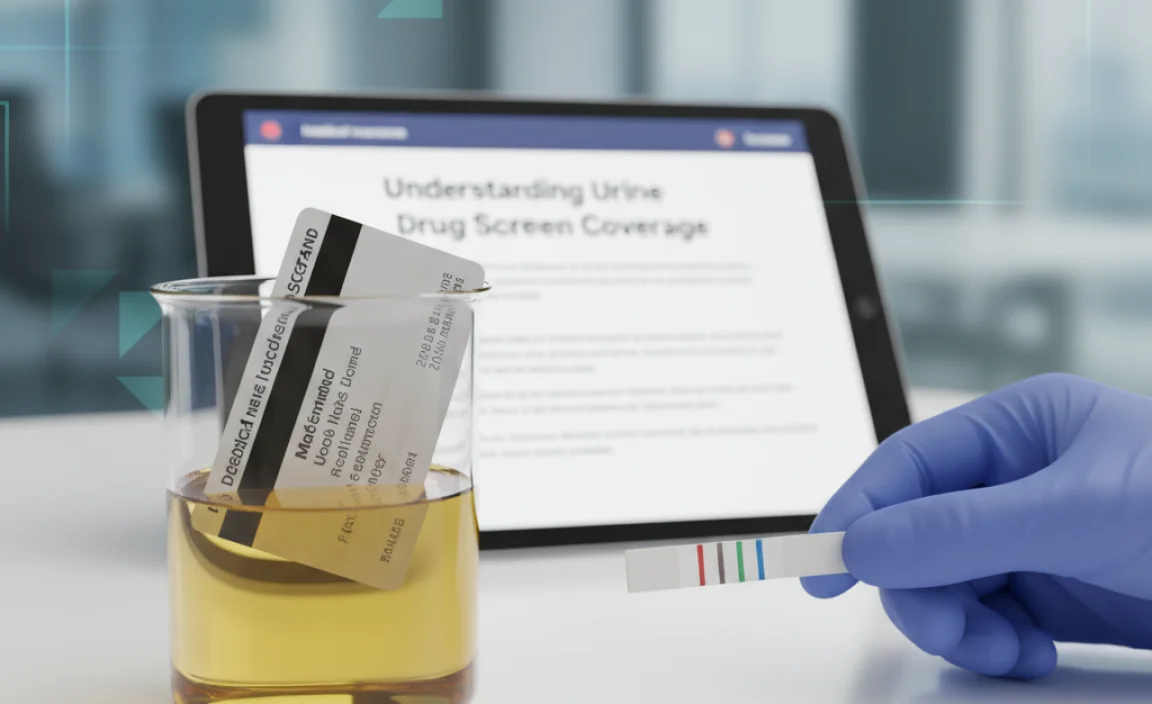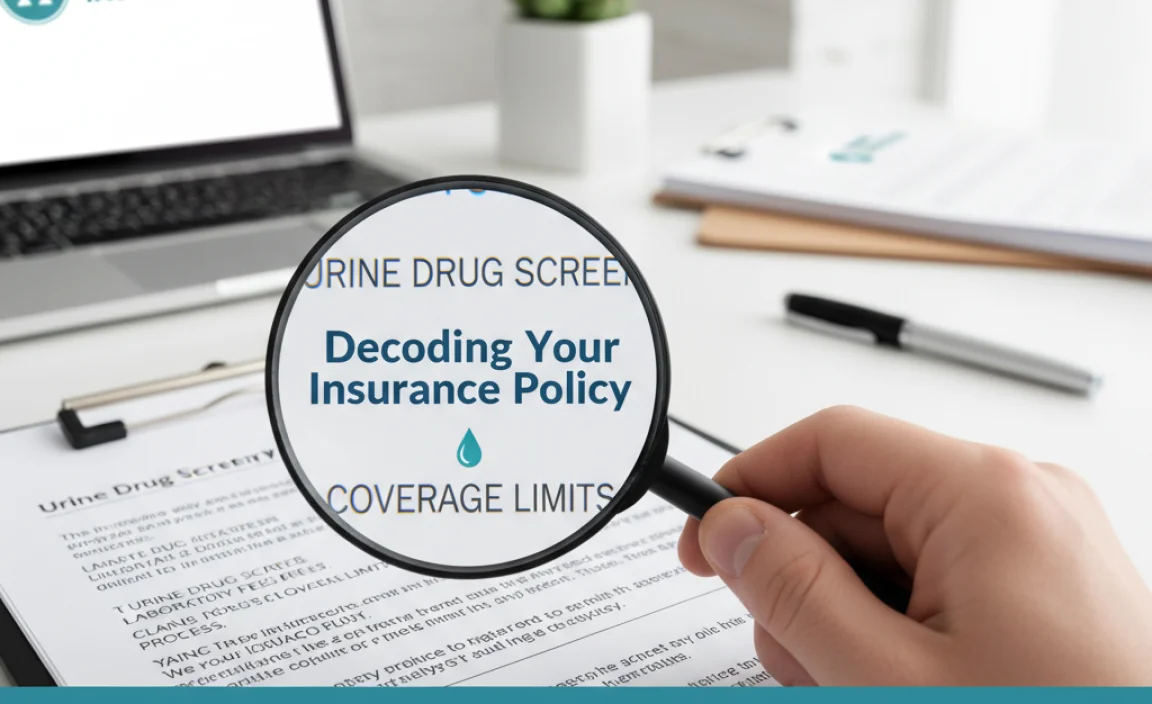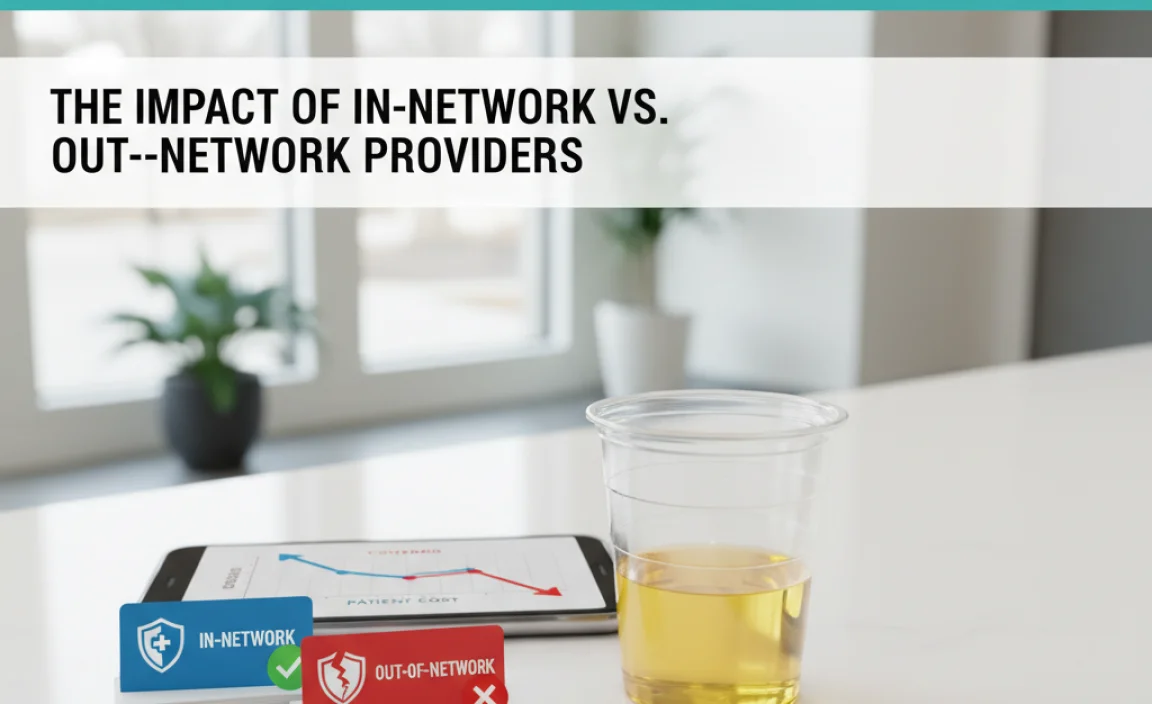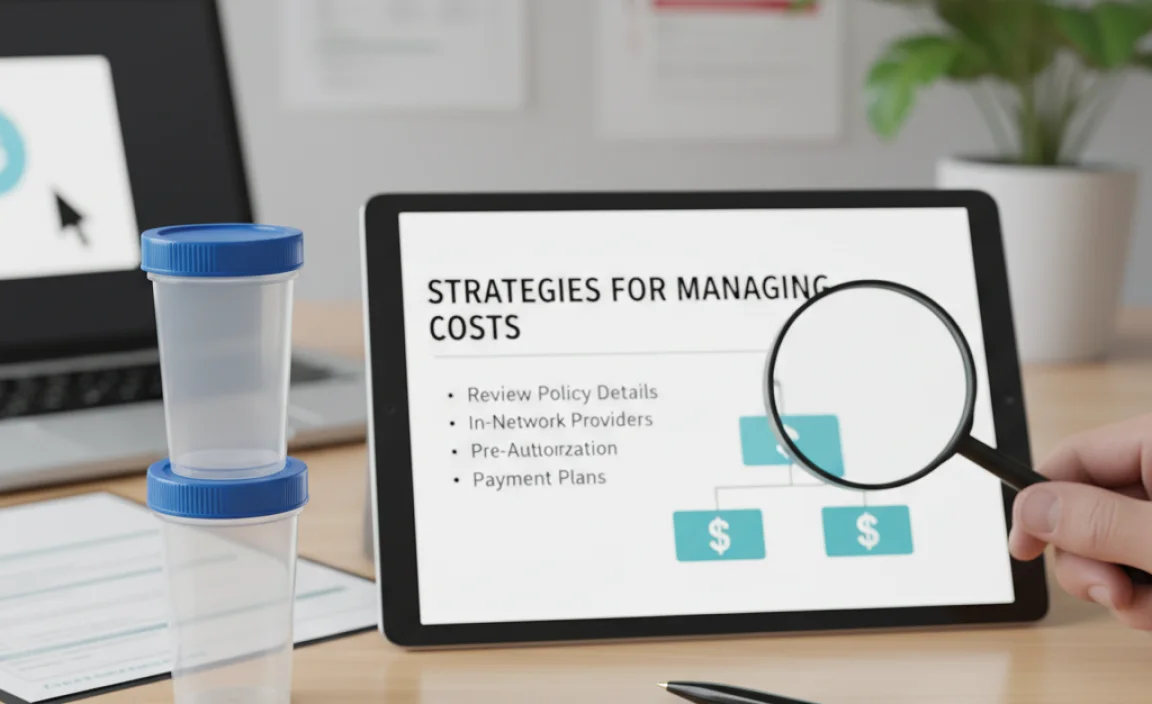Generally, yes, insurance can cover urine drug screens, but it depends on *why* you’re taking the test. If it’s medically necessary – like for diagnosis, treatment, or part of a prescribed medication monitoring plan – your insurance is more likely to cover it. However, employer-required screenings or those for legal purposes might not be covered. Always check your specific insurance plan details to be sure!
Ever feel like deciphering insurance coverage is like trying to understand a foreign language? You’re not alone! One question that often pops up is, “Does my insurance cover a urine drug screen?” It can be confusing because the answer isn’t always a simple “yes” or “no.” Don’t worry, we’re here to break it down for you in plain English. We’ll walk through the common scenarios, what to look for in your insurance policy, and how to avoid unexpected bills. Let’s get started and clear up the confusion!
Understanding Urine Drug Screen Coverage

Navigating the world of insurance coverage can feel overwhelming, especially when it comes to specific tests like urine drug screens. The key to understanding whether your insurance will foot the bill lies in the *reason* for the test and the specifics of your insurance plan. Let’s dive into the factors that influence coverage.
Medical Necessity is Key
Insurance companies primarily cover services deemed “medically necessary.” This means the test is required to diagnose or treat a medical condition. Here’s how that applies to urine drug screens:
- Diagnosis: If your doctor orders a urine drug screen to help diagnose symptoms or rule out certain conditions, it’s more likely to be covered.
- Treatment Monitoring: Some medications, particularly those with a risk of misuse or abuse, require regular monitoring through urine drug screens. Insurance often covers these tests as part of your treatment plan.
- Substance Abuse Treatment: If you’re participating in a substance abuse treatment program, urine drug screens are typically a standard part of the process and are often covered.
When Coverage Might Be Limited or Denied
Not all urine drug screens are created equal in the eyes of your insurance company. Here are scenarios where coverage may be questionable:
- Employment-Related Screenings: Many employers require pre-employment or random drug screenings. These are typically *not* covered by your health insurance, as they are considered the employer’s responsibility.
- Legal or Forensic Purposes: If you need a drug screen for legal reasons (e.g., court order, probation), your insurance usually won’t cover it.
- Sports or Extracurricular Activities: Drug testing for sports or school activities is generally not considered a medical necessity and won’t be covered.
- Lack of Medical Indication: If your doctor can’t provide a valid medical reason for the test, insurance might deny coverage.
Decoding Your Insurance Policy

The best way to know for sure whether your insurance covers urine drug screens is to understand your policy. Here’s a step-by-step guide to finding the answers you need:
Step 1: Find Your Policy Documents
Your insurance policy documents contain all the details about your coverage. You can usually find these documents:
- Online: Log in to your insurance provider’s website and look for a “Policy Documents,” “Coverage Details,” or “Plan Information” section.
- Mobile App: Many insurance companies have mobile apps where you can access your policy information.
- Paper Copy: If you enrolled in your insurance plan through your employer, check with your HR department.
Step 2: Look for “Drug Testing” or “Laboratory Services”
Once you have your policy documents, search for keywords like “drug testing,” “urine drug screen,” or “laboratory services.” This will lead you to the sections that specifically address coverage for these types of tests.
Step 3: Check for Exclusions and Limitations
Pay close attention to any exclusions or limitations listed in your policy. These sections will outline specific situations where coverage is *not* provided. For example, it might state that employment-related drug screenings are excluded.
Step 4: Understand Your Cost-Sharing Responsibilities
Even if your insurance covers the urine drug screen, you may still be responsible for a portion of the cost. This could include:
- Deductible: The amount you need to pay out-of-pocket before your insurance starts covering costs.
- Copay: A fixed amount you pay for a specific service, like a doctor’s visit or lab test.
- Coinsurance: A percentage of the cost you pay after you’ve met your deductible.
Here is a quick example:
| Scenario | Deductible | Copay | Coinsurance | Your Cost |
|---|---|---|---|---|
| Urine drug screen cost: $100. Deductible not met. | $500 | $20 | 20% | $100 (You pay the full amount since your deductible hasn’t been met) |
| Urine drug screen cost: $100. Deductible met. | $0 | $20 | 20% | $20 (Copay) |
| Urine drug screen cost: $100. Deductible met. No copay. | $0 | $0 | 20% | $20 (Coinsurance) |
Step 5: Contact Your Insurance Provider
If you’re still unsure about your coverage after reviewing your policy documents, don’t hesitate to contact your insurance provider directly. You can usually find their contact information on your insurance card or on their website.
When you call, be prepared to provide the following information:
- Your name and policy number
- The name and CPT code (Current Procedural Terminology code) for the urine drug screen. Your doctor’s office can provide this.
- The reason for the test (e.g., diagnosis, treatment monitoring)
Ask the representative to confirm whether the test is covered under your plan and what your out-of-pocket costs will be. It’s always a good idea to get this information in writing, if possible.
Navigating Prior Authorizations

Sometimes, insurance companies require prior authorization for certain tests or procedures. This means your doctor needs to get approval from the insurance company *before* the test is performed. Here’s what you need to know about prior authorizations for urine drug screens:
What is Prior Authorization?
Prior authorization is a process where your doctor submits a request to your insurance company, explaining why the urine drug screen is medically necessary. The insurance company reviews the request and decides whether to approve it.
Why is Prior Authorization Required?
Insurance companies use prior authorization to control costs and ensure that tests are medically necessary. It helps prevent unnecessary or inappropriate testing.
How to Find Out if Prior Authorization is Needed
The easiest way to find out if prior authorization is required is to contact your insurance provider. You can also ask your doctor’s office to check. They often have experience with prior authorization requirements for various insurance plans.
The Prior Authorization Process
If prior authorization is required, here’s what typically happens:
- Your doctor submits a request: Your doctor will fill out a form and provide supporting documentation, such as your medical history and the reason for the test.
- Insurance company reviews the request: The insurance company will review the information and may request additional details from your doctor.
- Decision is made: The insurance company will either approve or deny the request.
- You and your doctor are notified: You and your doctor will receive a notification of the decision.
What to Do if Prior Authorization is Denied
If your prior authorization is denied, you have the right to appeal the decision. Here are the steps you can take:
- Understand the reason for denial: The insurance company will provide a reason for the denial. Make sure you understand it.
- Gather additional information: Work with your doctor to gather any additional information that supports the medical necessity of the test.
- File an appeal: Follow the instructions provided by your insurance company to file an appeal. This usually involves submitting a written statement explaining why you believe the test should be covered.
- Consider an external review: If your appeal is denied by the insurance company, you may have the option to request an external review by an independent third party.
The Impact of In-Network vs. Out-of-Network Providers

Choosing the right provider can significantly impact your out-of-pocket costs for a urine drug screen. Here’s the difference between in-network and out-of-network providers:
In-Network Providers
In-network providers have a contract with your insurance company to provide services at a negotiated rate. This means you’ll typically pay less for services received from an in-network provider.
Out-of-Network Providers
Out-of-network providers do not have a contract with your insurance company. They can charge higher rates, and your insurance may not cover as much of the cost. In some cases, your insurance may not cover out-of-network services at all.
How to Find In-Network Providers
The easiest way to find in-network providers is to use your insurance company’s online provider directory. You can usually find this on their website or mobile app. You can also call your insurance company and ask them to provide a list of in-network providers in your area.
Questions to Ask a Potential Provider
Before getting a urine drug screen, it’s a good idea to ask the provider the following questions:
- Are you in-network with my insurance plan?
- What is the cost of the urine drug screen?
- Will you bill my insurance company directly?
- Do you require prior authorization for this test?
Strategies for Managing Costs

Even if your insurance covers a portion of the cost, urine drug screens can still be expensive. Here are some strategies for managing costs:
- Shop Around: Prices for urine drug screens can vary significantly between providers. Call around to different labs and clinics to compare prices.
- Ask for a Discount: Some providers offer discounts for patients who pay cash or who are uninsured. It never hurts to ask!
- Use a Health Savings Account (HSA) or Flexible Spending Account (FSA): If you have an HSA or FSA, you can use pre-tax dollars to pay for eligible medical expenses, including urine drug screens.
- Negotiate a Payment Plan: If you can’t afford to pay the full cost upfront, ask the provider if they offer a payment plan.
- Check for Financial Assistance Programs: Some hospitals and clinics offer financial assistance programs to help low-income patients pay for medical care.
Common Scenarios and Insurance Coverage
Let’s look at some common scenarios and whether insurance is likely to cover a urine drug screen in each case:
| Scenario | Likelihood of Coverage | Notes |
|---|---|---|
| Doctor orders a urine drug screen to diagnose a medical condition. | High | Coverage is likely if the test is deemed medically necessary. |
| Patient is being monitored for prescription drug use as part of a treatment plan. | High | Coverage is likely if the monitoring is considered medically necessary. |
| Employer requires a pre-employment drug screening. | Low | These screenings are usually the employer’s responsibility. |
| Individual needs a drug screen for a court order or probation. | Low | Insurance typically doesn’t cover legal or forensic testing. |
| Student athlete is required to undergo drug testing by their school. | Low | Testing for sports or extracurricular activities is usually not covered. |
| A person requests a drug screen for personal reasons, without a doctor’s order. | Low | Insurance usually requires a medical reason for the test. |
Potential Issues and How to Resolve Them
Even when you think you’ve done everything right, issues can still arise with insurance coverage. Here are some common problems and how to resolve them:
- Claim Denied: If your claim is denied, review the reason for the denial and gather any additional information that supports the medical necessity of the test. File an appeal with your insurance company.
- Unexpected Bill: If you receive an unexpected bill, contact your insurance company and the provider to understand why. There may have been a billing error or a misunderstanding about your coverage.
- Prior Authorization Issues: If your prior authorization is denied, work with your doctor to gather additional information and file an appeal.
- Out-of-Network Charges: If you received services from an out-of-network provider, try to negotiate a lower rate with the provider or ask your insurance company to pay a portion of the cost.
The Future of Drug Screen Coverage
The landscape of healthcare and insurance coverage is constantly evolving. Here are some trends to watch regarding drug screen coverage:
- Increased Focus on Value-Based Care: Insurance companies are increasingly focusing on value-based care, which means they’re looking for ways to improve the quality of care while reducing costs. This could lead to more scrutiny of drug testing practices and a greater emphasis on medical necessity.
- Expansion of Telehealth: Telehealth is becoming more common, and it’s possible that drug testing could be integrated into telehealth services in the future. This could make testing more accessible and convenient for patients.
- Changes in Drug Policies: As drug policies continue to evolve, insurance coverage for drug testing may also change. For example, as more states legalize marijuana, insurance companies may need to update their policies regarding marijuana testing.
Conclusion
Understanding whether your insurance covers a urine drug screen can feel like a maze, but with the right information, you can navigate it successfully. Remember, medical necessity is key, and your insurance policy holds the specific details of your coverage.
By reviewing your policy, contacting your insurance provider, and understanding the prior authorization process, you can avoid unexpected bills and ensure you get the coverage you deserve. Stay informed, be proactive, and don’t hesitate to advocate for your health!
Frequently Asked Questions
1. Will my insurance cover a drug test for a new job?
Generally, no. Drug tests required by employers are typically not covered by health insurance. The employer is usually responsible for these costs.
2. What if my doctor orders a urine drug screen – is it always covered?
Not always, but it’s more likely. If the test is deemed medically necessary for diagnosis or treatment, it has a higher chance of being covered. Check with your insurance to confirm.
3. How can I find out if a urine drug screen requires prior authorization?
Contact your insurance provider directly or ask your doctor’s office to check. They often have experience with the prior authorization requirements for various insurance plans.
4. What does “in-network” vs. “out-of-network” mean for drug screen costs?
In-network providers have negotiated rates with your insurance company, so you’ll usually pay less. Out-of-network providers can charge higher rates, and your insurance may cover less (or none) of the cost.
5. What if my insurance denies coverage for a urine drug screen?
You have the right to appeal! Review the reason for the denial, gather any supporting information, and follow your insurance company’s instructions for filing an appeal.
6. Can I use my HSA or FSA to pay for a urine drug screen?
Yes, typically you can use funds from your Health Savings Account (HSA) or Flexible Spending Account (FSA) to pay for eligible medical expenses, including urine drug screens.
7. What’s the first thing I should do to check my coverage for a urine drug screen?
Start by reviewing your insurance policy documents. Look for sections on “drug testing” or “laboratory services” to understand your plan’s specific coverage details and any exclusions.
